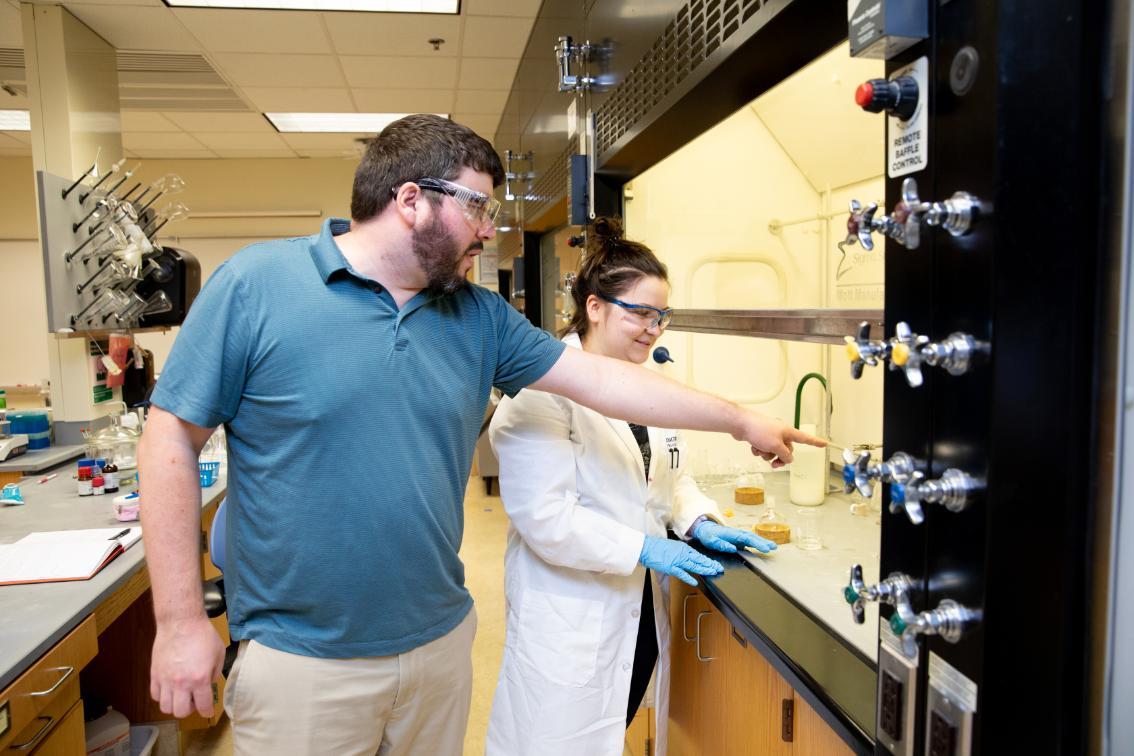

As of this academic year, Longwood has a new option for chemistry majors who are interested in integrating the study of biology with chemistry—a new biochemistry concentration.
Biochemistry is the study of chemistry in the context of living organisms, and there is growing interest in the field. Dr. Sarah Porter, professor of analytical chemistry and chemistry area coordinator, said the concentration was developed to better meet the needs of students who are interested in both chemistry and biology, or are interested in science in general but don’t yet know what they want to study.
“We have a number of students who come in as chemistry majors who want to do a biology minor or, conversely, are biology majors who want to do a chemistry minor. Because they want to see where those two things meet,” Porter said. “Those are the students who will really fit nicely in the biochemistry program.”
Dr. Jonathan White, assistant professor of chemistry, is a biochemist who led the development of the new curriculum. He said the concentration will appeal to students who are planning careers in the medical field or who have an interest in chemical or laboratory science research.
The skills students are going to get in this concentration are broad enough that it will prepare someone to go to medical school, graduate school, or pharmacy school; get a job as a chemist; go into the pharmaceutical industry.
Dr. Jonathan White, assistant professor of chemistry Tweet This
“The skills students are going to get in this concentration are broad enough that it will prepare someone to go to medical school, graduate school, or pharmacy school; get a job as a chemist; go into the pharmaceutical industry,” White said. “The integrative curriculum is such that it prepares students well for any laboratory science profession, any health or medical profession, and any graduate school.”
White is currently doing biochemistry research on platinum-based anti-cancer drugs, and biochemistry students have an opportunity to get hands-on research experience working with him.
Porter said there has been a desire to develop a biochemistry program for several years. Longwood’s chemistry program recently received American Chemical Society approval for 2022 graduates. The ACS Approval Program sets a standard for the chemistry curriculum that is recognized across the country, and makes graduates more attractive to employers and post-baccalaureate programs.
We are really excited to offer this biochemistry concentration that allows students to explore those connections, gives them a breadth of knowledge and then orients them in the trajectory of where their interests lie.
Dr. Jonathan White, assistant professor of chemistry Tweet This
As part of the ACS approval process, there was an opportunity to add a new faculty member and White was hired to develop the biochemistry concentration.
“We have been talking about the biochemistry program for a really long time, but we needed someone who was actually a biochemist in our department,” Porter said.
White said that in developing the curriculum for the new concentration he focused on creating an integrative experience for students so that they have an opportunity to use what they are learning in biology with the material they are learning in their chemistry classes.
Students who choose the biochemistry concentration will take foundational courses in biology and chemistry during their first two years at Longwood. In their junior and senior years, they will take dedicated upper-level biochemistry courses, work on research projects and learn laboratory techniques that are specific to biochemistry.
“Chemistry is the central science, and it touches many different other fields,” White said. “We are really excited to offer this biochemistry concentration that allows students to explore those connections, gives them a breadth of knowledge and then orients them in the trajectory of where their interests lie.”
